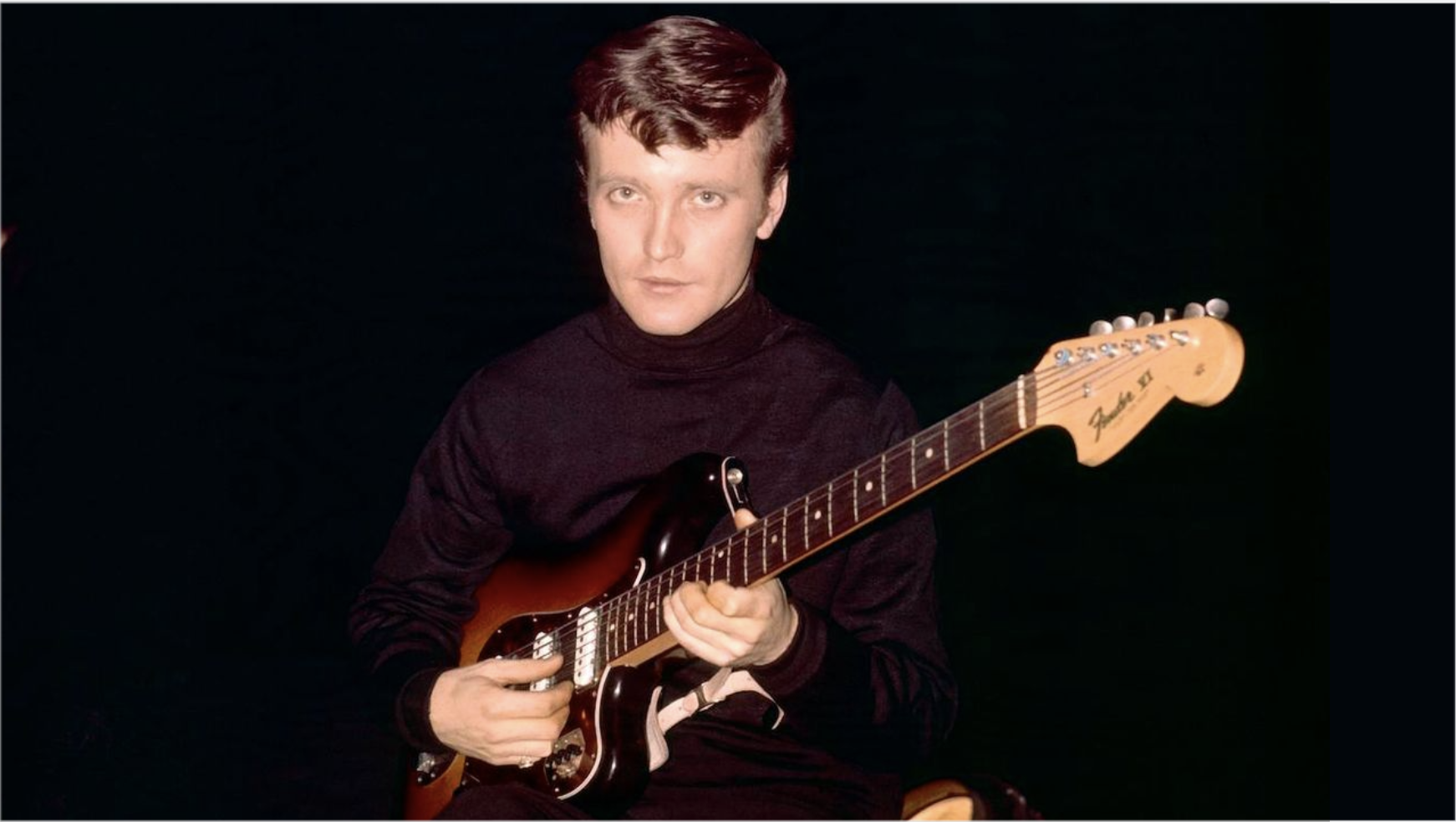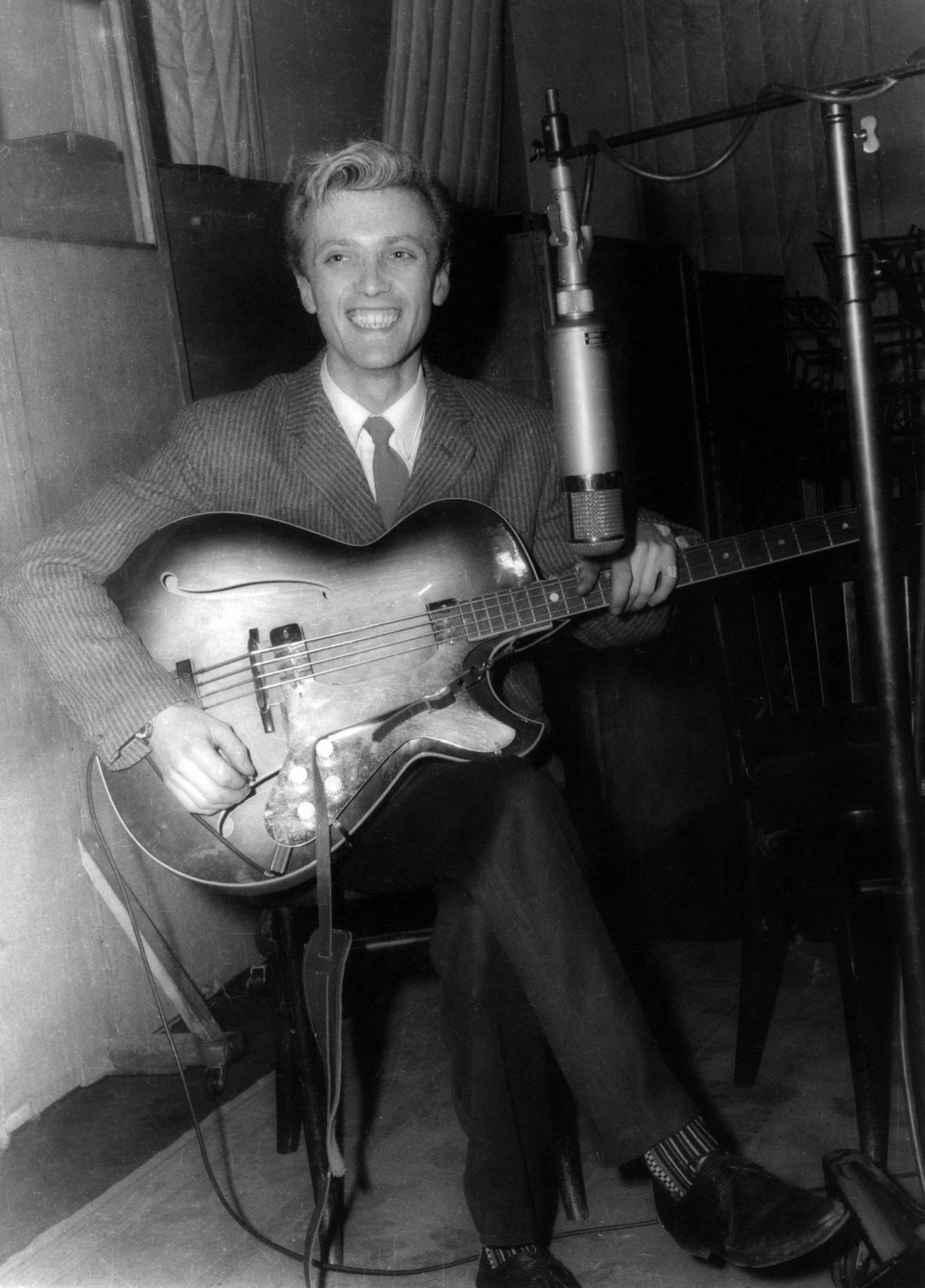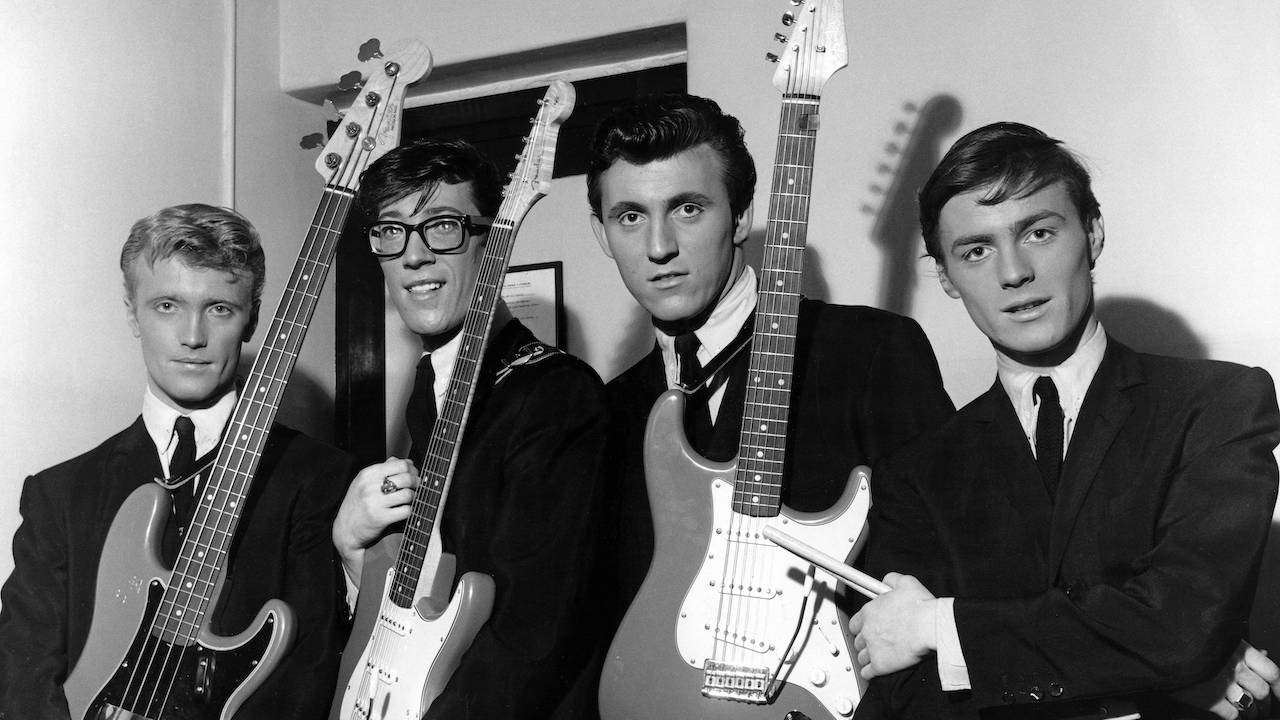
“If it wasn't for Jet Harris," Paul McCartney once said, "I would never have picked up a bass guitar.” A founder member of The Shadows, and a solo star for a short period in the 60s, Jet Harris was the inspiration for an entire generation of British bass players, including McCartney, John Paul Jones and Lemmy. “Jet Harris was very innovative for his time, given the band he was in,” said Lemmy. “He gave me the idea that the bass player didn’t have to stand at the back.”
Blessed with good looks, a moody persona, a chip on his shoulder and a monkey on his back, he was Britain’s first rock’n’roll bad boy and (if you were standing far enough away) the coolest guy around. Jet was the first pro bass guitarist in the country and certainly one of the finest, first in one of the UK’s most influential bands – The Shadows – and then as a solo hitmaker who played the first Fender VI Bass to arrive on UK shores. His influence on British bass playing was so great that in 2010 Fender presented him with an award for effectively launching the bass guitar in the early 60s. But alcohol-fuelled bad behavior, gossip page scandals – including singer Cliff Richard’s affair with his wife – and a near-fatal car accident conspired to derail his career.
Born Terence Harris in 1939, and nicknamed “Jet” at school because he was a fast runner, Harris dabbled in the clarinet before being inspired by the bass notes hammered out by boogie-woogie pianist Winifred Atwell. “The bass line,” he said, “is what makes a number growl.”
Jet took to the double bass, making his own upright to begin with, playing in jazz clubs and joining a band called Tony Crombie’s Rockets that had one eye on the rock’n’roll explosion. Music was changing. When the eagle-eyed Crombie bought Jet a hollow-bodied Framus Star bass guitar, Harris became the first known musician in the UK to play an electric bass.

He recorded with The Vipers, a skiffle group making the switch to rock’n’roll and played on their 1958 cover of Eddie Cochran’s Summertime Blues. Jet’s bass is the first noise you hear.
At Soho musicians hangout, the 2i's Coffee Bar, he met Brian Rankin, Bruce Cripps and Harry Webb, men who would become better known as Hank Marvin, Bruce Welch and Cliff Richard. Their band, Cliff Richard and the Drifters had already had UK hits under a different line-up. Their debut single, Move It, had gone to no.2 in the UK charts in September 1958 and is considered to be Britain’s first rock’n’roll hit.
Jet was in and made an immediate impact: The Drifters weren’t just the backing band for Cliff Richard, they had their own career. Their second single, Jet Black, was written by Harris and another great showcase for the bass player.
When US band The Drifters slapped an injunction on their debut single Feelin’ Fine, Jet suggested another name: The Shadows. In 1959, his Framus was damaged in a backstage accident and he found himself with another first: a Fender Precision bass, the first one in the country. That same year, The Drifters backed Cliff Richard on record for the first time: the result, Livin’ Doll, was a UK no.1 and started a huge run of chart success. In Jet’s tenure, the band scored 15 top 5 hits in the UK.
The Shadows’ career followed in parallel: groundbreaking instrumental Apache went to no.1 in August 1960, knocking their own track with Cliff Richard, Please Don’t Tease, off the number 1 spot. Hits like FBI, Man of Mystery, Kon Tiki and Wonderful Land followed, putting both electric and bass guitar on the map. Their influence was immense. “If it wasn't for Jet Harris, I would never have picked up a bass guitar,” said Paul McCartney.
Not only was he paving the way for a new generation of bassists, behind the scenes Harris was drawing the blueprint for rock’n’roll excess. His alcohol intake was legendary. He’d started young, to give himself some dutch courage before going onstage, but it did more than that, getting him in fights and causing friction in the band.
“Jet would have a few brown ales and it would all be over,” drummer Brian Bennett recalled. “He’d get a stream of verbal from Bruce [Welch, guitarist] and go on stage in a really black mood. As soon as Bruce was looking the other way, Jet would look back at me on the drums and mouth, ‘The effing bastard’… Dressing-room rows would end with Jet in tears.”
His driving was out of control too. In 1959, having not even passed his test, he crashed his car, injuring himself and Hank Marvin. He was fined for dangerous driving, failing to display L-plates and driving unaccompanied by a qualified driver. His friend Terry Webster recalled Jet later having “a brick handy near his accelerator – a sort of cruise control for the long journeys back to London”.

At The Cavern in Liverpool, Harris fell off the stage during a performance of Shadoogie. “Smashed out of his head,” said Bruce Welch. “As Hank helped him up and back onto the stage, I apologised to the audience. ‘I’m very sorry, Jet’s not very well,’ I said. It didn’t work. Some Scouser in the audience yelled back, ‘We know, mate – he’s pissed!’” The incident became so famous in Liverpool that Paul McCartney would copy it, pretending to fall off the stage, Jet-style.
To add to his chaotic personal life, Jet was having multiple affairs. His wife Carol found out and found revenge in an affair with frontman Cliff Richard. In his autobiography, Cliff claimed that Carol seduced him. In 2009 she told her side to the Daily Mail in a story headlined: “How I was seduced in my curlers: The only woman Cliff Richard ever made love to gives her own very different side of the story”.
“I'm not the seducer of Cliff Richard,” she said. “The truth is he never left me alone. It's all twisted now to make it seem like I was the one who did the running. I can assure you, it was all him.”

Jet knew about the affair but continued in the band. Later he claimed that it drove him further to drink. “Put it this way,” he said, “I think what happened helped my alcoholism along the way. There were things that I couldn’t, wouldn’t, think about. I drank to forget.” Why didn’t he do something about it, he was asked. “I wanted my job. Maybe, if I’m honest, I wanted the job more than I wanted her.”
In 1962, Jet got stuck into the free backstage bar at the NME Poll Winners Party, and moments before he went on stage to collect the Best Instrumentalist Award, The Shadows sacked him. They'd had enough.
Down but not out, he wasted no time. There was more new ground to break: Jet got hold of the first Fender VI Bass to arrive in the UK and set off on a solo career, backed by a band he called The Jet Blacks. The sound of the Fender VI twangs all over his first two singles, Besame Mucho and Main Title Theme (The Man With The Golden Arm). In January 1963 he teamed up with former Drifters drummer Tony Meehan for Diamonds. It went to no.1. A young guitarist called Jimmy Page did his first session work on the single, and when they went on the road, they took a young bass player called John Paul Jones with them.
"We all wanted to look like Jet Harris,” said John Paul Jones. “I got into session playing through Jet Harris and Tony Meehan. I walked up to him on Archer Street and asked him if he needed a bass player. He said, 'No I don't, but they do,' pointing me towards the Jet Blacks. He was leaving them, so I auditioned and joined up. Later he heard about me, swapped his bass player for me, and I went on the road with them."
Despite everything, Jet seemed unstoppable.
The inevitable crash was literal and almost fatal. In September 1963, his car collided with a bus. Jet and his girlfriend, singer Billie Davis, were both hospitalised and Harris had minor brain damage requiring 34 stitches in his head. Meanwhile, the story of the married pop star with a teenage starlet in his car (Davis was 17, he was 24) was all over the papers. Although he was separated from his wife Carol, her affair with Cliff Richard was not public knowledge, and the scandal ruined both of their careers. "We were the Posh and Becks of our time,” he said later of himself and Davis. “Honest to God. We couldn’t move without cameras being poked in our faces. It was a scandal, and we never really recovered from it.’

Jet went on a spiral. Arrested in Brighton. Hospitalise in Paddington. Drunk and disorderly in Marble Arch. Banged up for drunk driving. In 1967 an audition for the fledgling Jeff Beck Group offered some redemption. “Jeff's first idea was to invite Jet Harris, once of the Shadows, to play bass, and Viv Prince, formerly of the Pretty Things, to be the drummer,” Rod Stewart wrote in his autobiography. “This was an ambitious plan – or, you might even say, raving mad. Harris looked great – he had a big peroxide hairdo – but he was still in recovery from a terrible car accident and was known to be having some struggles with alcohol. Prince's drumming style, meanwhile, made Keith Moon look conservative.” Beck got that pillar of sobriety Ronnie Wood instead.
Jet struggled with alcohol and over the next couple of decades worked as a bus conductor, hospital porter, taxi driver, brick layer. Declared bankrupt in 1988, he got sober in 1996 and stayed that way til the end of his life, making a modest return to performing and playing. In 1998, Fender gave him a Lifetime Achievement Award for his role in popularising the bass guitar in Britain. He played regularly, did a theatre show called Me and My Shadows and was joined by a special guest: Billie Davis. UK rock'n'roll Marty Wilde took him on the road and the end of tour show featured original Shadows Hank Marvin, Bruce Welch, Licorice Locking (who had replaced Jet) and Brian Bennett on stage onstage with Jet and the rest of the show's company.
In 2010 he was made a Member of the Order of the British Empire (MBE) in the New Year Honours list and died the following year on 18 March, 2011, after suffering from throat cancer. Britain's first bass player – his basslines reverberate still.








